Brainstorming: The Science and Politics of Opiate Research
Select Format
Select Condition 
Book Overview
Describes the scientific research that led to a better understanding of how drugs affect the brain and looks at the future of drug research.
Format:Hardcover
Language:English
ISBN:0674080483
ISBN13:9780674080485
Release Date:September 1989
Publisher:Harvard University Press
Length:208 Pages
Weight:1.10 lbs.
Dimensions:0.8" x 6.3" x 9.4"
Customer Reviews
1 rating
The 2% solution
Published by Thriftbooks.com User , 17 years ago
"Brainstorming": was published in 1989, just in time for a new drug war. There have other new, new drug wars since. "Brainstorming" was not encouraging, but it is still worth reading. Richard Nixon was no more sincere about drugs than about anything else. Nevertheless, Nixon's drug war had one good, dramatic and unplanned result. Solomon Snyder, a laboratory medical researcher, had not paid any attention to opiate addiction until a friend was appointed Nixon's drug czar. By a little bureaucratic one-upsmanship, they managed to shake loose some money (about 2% of the federal antidrug effort) for basic research. The results were immediate and extraordinary. Snyder and his student Candace Pert identified the receptors in the brain that accept opiates. This explained the mysterious effect of naloxone, which was already used in 1973 to shut down an opium overdose. Other researchers found similar receptors in the pituitary gland, a big surprise. The obvious question was: Why had evolution equipped humans with specialized nerve systems to recognize the juice of a poppy? (Another of Snyder's students, a high school student, David Aposhian, showed that all vertebrates have opiate receptors, and it was later shown that invertebrates do, too.) The answer was that the body creates its own powerful drugs, later named enkephalins and endorphins, and the juice of the poppy happens to mimic their effect. This led to hopes for a powerful synthetic drug that would block addicting opiates, and for new, non-addicting painkillers. Snyder explains why neither hope was fulfilled. Nor are they likely to be. On the other hand, the research techniques -- and even more important, the conceptual innovations -- used in the opiate research opened a window on an unsuspected feature of physiology. Though a failure from the antidrug point of view, the knowledge gained has been helpful against many other diseases, such as diabetes. This is not at all what Nixon and his henchmen intended. They just wanted votes. George Bush I's drug war has already had its unexpected effect. Unexpected by me, anyway. A most diverse array of commentators -- including many with impeccable conservative credentials, like Milton Friedman -- have responded to Bush's call for action with countercalls for realism. Snyder is among these. In 15 lucid pages he explains why antidrug laws, starting with the Harrison Narcotics Act of 1914, turned drug use in the United States from a mild problem, which resulted in no deaths, into a continuous disaster that has killed tens of thousands. Provocative thoughts are packed into Snyder's slim volume, and reforming America's moralistic approach to drugs seems to be among the least significant to him. His exciting story about breakthrough research has its moments of scandal. "One might have thought that our work identifying and characterizing opiate receptors would be welcomed by narcotic researchers," but one would have been wrong. But beyond telling thi





